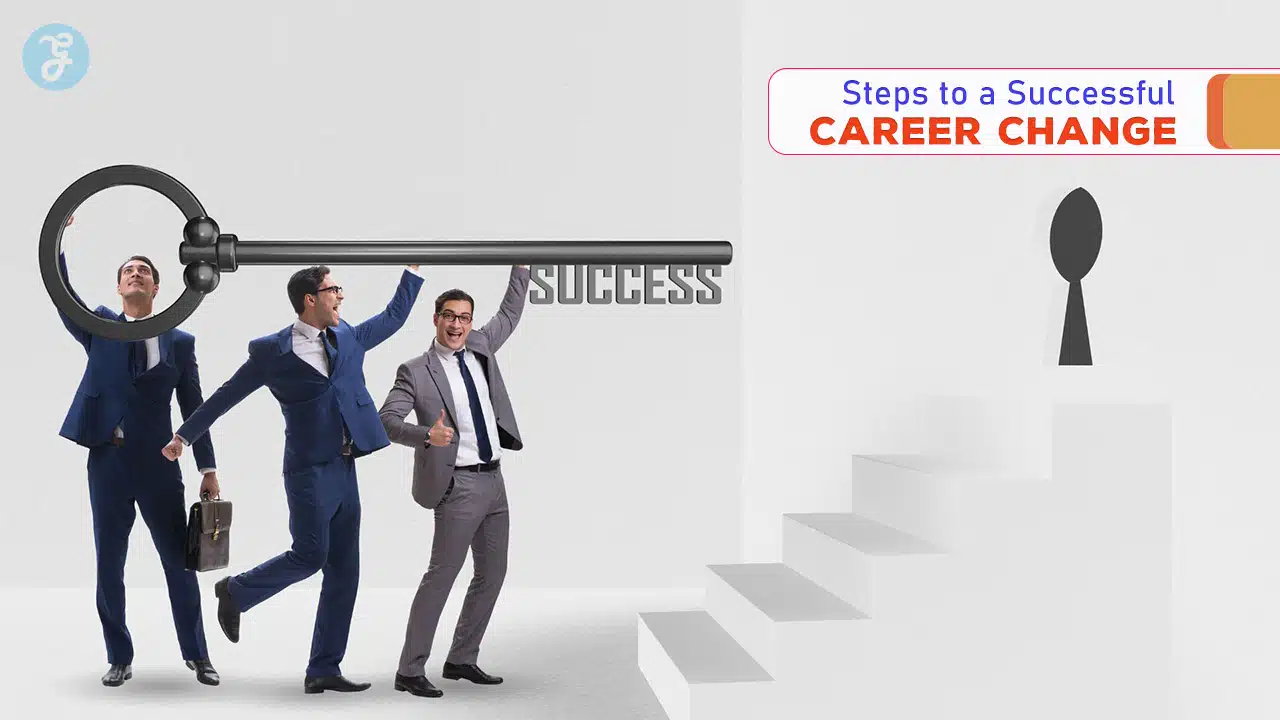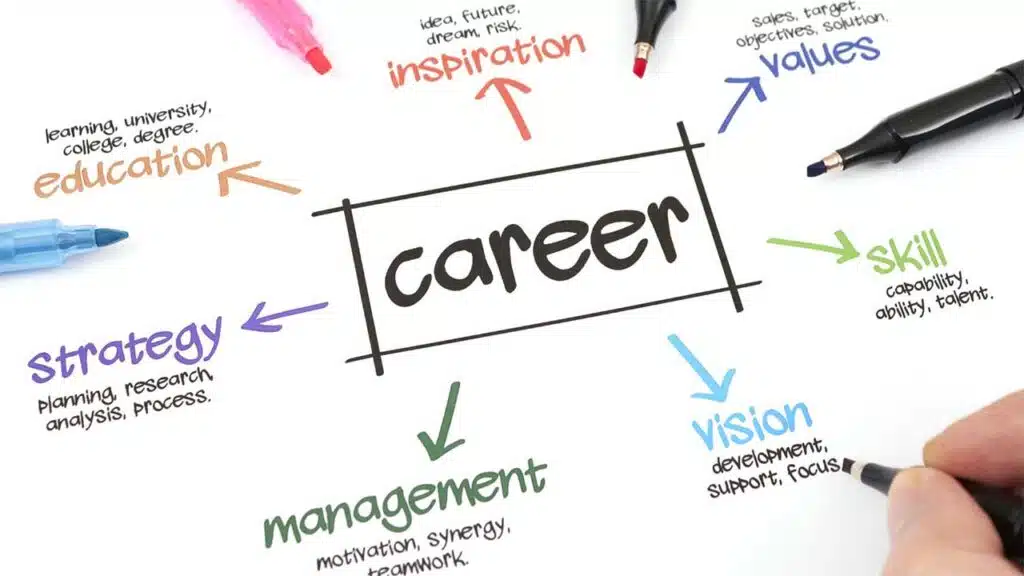Thinking about changing careers? You’re not alone. Many people consider switching paths to find better pay, less stress, or more fulfillment. A career change can be exciting and scary at the same time. It’s a big step that needs careful planning.
Making a successful career change takes time and effort, but it can lead to greater job satisfaction and happiness.
This article will guide you through 10 key steps to help you switch careers smoothly. Whether you’re looking for a new challenge or want to follow your passion, these tips can help you make the right move.
1. Identify your transferable skills
Changing careers can be exciting, but it can also feel daunting. You might worry that you lack the right skills for a new field. Don’t panic! You likely have more to offer than you realize.
Transferable skills are abilities you can use in different jobs and industries. These skills are valuable in many roles, regardless of your specific experience.
To identify your transferable skills, start by looking at your past jobs, volunteer work, and hobbies. What tasks did you enjoy? What were you good at? Make a list of these skills.
Common transferable skills include communication, problem-solving, and teamwork. Think about times you’ve used these skills in your current or past roles.
Next, research job descriptions in your target field. What skills do they ask for? Compare these to your list. How many match up might surprise you.
Don’t forget about skills from your personal life. Maybe you’re great at organizing family events or managing a household budget. These count too!
Ask friends, family, or coworkers for input. They might see strengths in you that you’ve overlooked.
Remember, it’s not just about having skills. It’s about showing how they apply to new situations. Be ready to give examples of how you’ve used these skills effectively.
By identifying your transferable skills, you’ll feel more confident about making a career change. You’ll also be better prepared to showcase your value to potential employers.
2. Research potential new fields
Start by making a list of careers that interest you. Look at job sites and career guides to learn about different options. Pay attention to the skills and education needed for each field.
Talk to people who work in jobs you’re curious about. Ask them what they like and don’t like about their work. This can give you a real-world view of different careers.
Look at job growth trends and salary information. Some fields are growing fast, while others are shrinking. Choose a field that has good future prospects.
Consider taking online courses or workshops to try out new areas. Many websites offer free classes in various subjects. This can help you see if you enjoy the work before making a big change.
Think about how your current skills might fit into new fields. You may be surprised at how your experience can apply to different jobs. Look for ways to connect your background to new career paths.
Don’t forget to consider your personal interests and values. A career that matches what you care about can be more satisfying in the long run.
3. Network with professionals in the desired industry
Networking is key when changing careers. It helps you learn about your new field and make important connections.
Start by reaching out to people on LinkedIn who work in your target industry. Send polite messages asking to chat about their experiences.
Attend industry events and conferences. These are great places to meet people face-to-face and learn about current trends.
Join professional associations related to your desired field. Many offer networking events, online forums, and mentorship programs.
Don’t be afraid to ask for informational interviews. Most professionals are happy to share advice with career changers.
Be prepared with questions when you meet new contacts. Ask about their career path, daily work, and tips for breaking into the industry.
Follow up after networking interactions. Send a thank you note and stay in touch occasionally. Building relationships takes time.
Offer to help your new contacts when you can. Networking works best when it’s a two-way street.
Remember to network within your current company too. Colleagues may have connections in your target industry.
4. Consider further education or certifications
Changing careers often means learning new skills. You might need to go back to school or get special certificates. This can help you qualify for jobs in your new field.
Think about what knowledge you need for your desired career. Look into degree programs at local colleges or online schools. Some careers may require a bachelor’s or master’s degree.
Certifications can be a quicker way to gain new skills. Many industries offer professional certifications. These show employers you have specific knowledge.
Project management, IT, and healthcare have lots of certification options. Research which ones are most valued in your target field.
Online courses and workshops can also boost your skills. Platforms like Coursera and edX offer classes from top universities. These can be more flexible and affordable than traditional schooling.
Remember, learning takes time and money. Plan how you’ll fit education into your schedule and budget. It’s an investment in your future career success.
5. Update your resume and LinkedIn profile
Your resume and LinkedIn profile are key tools for a career change. You need to revise them to fit your new career goals.
Start by rewriting your resume summary. Focus on skills that apply to your new field. Highlight any relevant experience or projects, even if they were not part of your main job.
Change your job descriptions. Emphasize tasks and achievements that relate to your new career. Use words and phrases common in your target industry.
Add a skills section to your resume. List abilities that match what employers in your new field want. Include both hard and soft skills.
On LinkedIn, update your headline. Make it reflect your new career goals. Use keywords that recruiters in your target industry might search for.
Fill out the “About” section on LinkedIn. Write about your passion for your new field. Mention any courses, certifications, or projects you’ve done to prepare for this change.
Join LinkedIn groups related to your new industry. Follow companies you’re interested in. This shows your engagement with the field.
Ask for recommendations from people who can speak to skills relevant to your new career. These could be colleagues, mentors, or teachers from recent courses.
Keep your profiles current. Add new skills and experiences as you gain them. This shows your ongoing commitment to your new career path.
6. Tailor your job search materials for each application
When you’re changing careers, you need to make your job search materials stand out. This means customizing your resume and cover letter for each job you apply to.
Look closely at the job description. Pick out key words and skills the employer wants. Then, make sure your resume and cover letter highlight these things.
Use your cover letter to explain how your past experience fits the new role. Show how your skills transfer to this new field. This helps employers see why you’re a good fit.
Don’t just send the same resume to every job. Take time to adjust it for each position. Put your most relevant experience and skills at the top. This makes it easy for employers to see why you’re right for the job.
Remember to update your LinkedIn profile too. Make sure it matches the information on your resume. Many employers check LinkedIn, so it’s important to keep it current.
By tailoring your materials, you show employers you’re serious about the role. It also proves you’ve done your homework on the company. This extra effort can make a big difference in your job search.
7. Prepare for common interview questions
Getting ready for interviews is key when changing careers. You should practice answering common questions ahead of time. This will help you feel more confident and give better responses.
Think about your reasons for switching careers. Be ready to explain why you want to make this change. Employers will want to know your motivation.
Highlight skills from your previous job that apply to the new role. Show how your past experience is valuable, even in a different field. Give specific examples of how you’ve used these skills.
Be honest about any gaps in your knowledge. Explain how you plan to learn what you need for the new job. This shows you’re proactive and eager to grow.
Practice talking about your accomplishments. Use the STAR method – Situation, Task, Action, Result. This helps you give clear, focused answers about your achievements.
Prepare questions to ask the interviewer too. This shows you’re interested and have done your research about the company and role.
Remember to stay positive. Focus on why you’re excited about this new career path. Your enthusiasm can make a big difference in the interview.
8. Research companies and industries thoroughly
Start by making a list of industries that interest you. Look at job market trends to see which sectors are growing. This can help you find areas with good future prospects.
Use online resources to learn about different companies. Check their websites, social media, and news articles. This will give you an idea of their culture and values.
Look for companies that match your personal goals and interests. You might find a perfect fit in an industry you hadn’t considered before.
Talk to people who work in your target industries. They can give you insider knowledge about day-to-day work life. Ask about challenges and rewards in their field.
Attend industry events or job fairs. These are great places to network and learn more about potential employers.
Read industry publications and reports. They can help you understand current issues and future trends in your chosen field.
Don’t forget to research salary ranges and job requirements. This will help you set realistic expectations for your career change.
By doing thorough research, you’ll be better prepared to make informed decisions about your new career path.
9. Assess your financial situation before the transition
Before changing careers, take a close look at your money. This step is crucial for a smooth transition. Start by listing all your income sources and regular expenses.
Check your savings and emergency fund. Do you have enough to cover living costs during the job switch? Experts often suggest having 3-6 months of expenses saved up.
Review your debts. Credit cards, loans, and mortgages can affect your career change plans. Consider ways to reduce or manage these obligations.
Look at your current benefits. Health insurance, retirement plans, and other perks have value. Factor these into your decision-making process.
Think about your future earning potential. Will your new career pay more or less? How might this impact your lifestyle and financial goals?
Consider the costs of your career change. You might need extra training or certifications. Budget for these expenses in advance.
Don’t forget about taxes. A new job or self-employment can change your tax situation. Plan accordingly to avoid surprises.
By assessing your finances, you’ll be better prepared for your career change. This knowledge helps you make informed decisions and set realistic goals.
10. Seek out mentors or career coaches
Mentors and career coaches can be valuable allies in your career change journey. They offer guidance, support, and insights that can help you navigate tricky transitions.
Finding a mentor doesn’t have to be complicated. Start by looking within your current network. Is there someone you admire in your target field? Reach out and ask if they’d be willing to chat.
When approaching potential mentors, be clear about your goals. Explain why you think they’d be a good fit and what you hope to learn. Be respectful of their time and come prepared with specific questions.
Career coaches can offer more structured support. They can help you identify transferable skills, polish your resume, and practice interviewing. Many coaches specialize in career transitions.
Don’t limit yourself to just one mentor or coach. Different people can offer varied perspectives and advice. You might have one mentor for industry knowledge and another for leadership skills.
Remember, mentorship is a two-way street. Think about what you can offer in return. Maybe you have skills or connections that could be useful to your mentor.
Regular check-ins with your mentors or coaches can keep you accountable and motivated during your career change. Set clear goals for each meeting to make the most of your time together.
Assessing Your Current Career
To make a successful career change, you need to take a close look at where you are now. This means thinking about what you like and don’t like about your job, and figuring out what skills you have and what you need to learn.
Identifying Dissatisfaction
Start by making a list of things you enjoy and dislike about your current job. Think about your daily tasks, work environment, and company culture. Ask yourself:
- Do you feel excited to go to work?
- Are you using your strengths?
- Does your job match your values?
Pay attention to patterns. If you find yourself dreading certain tasks or feeling drained after work, it’s a sign something needs to change.
Try keeping a work journal for a few weeks. Write down how you feel each day and what tasks you did. This can help you spot trends and pinpoint what’s not working.
Analyzing Skill Gaps
Look at job postings for careers you’re interested in. What skills do they require? Compare these to your current abilities. Make two lists:
- Skills you already have
- Skills you need to develop
Be honest about your strengths and weaknesses. It’s okay if there are gaps – that’s normal when changing careers.
Think about how you can build new skills:
- Take online courses
- Volunteer for projects at work
- Join professional groups
Don’t forget about soft skills like communication and teamwork. These are often just as important as technical skills in a new career.
Exploring New Career Paths
When changing careers, it’s crucial to look at different options and gather info. This helps you make smart choices about your next move. Let’s explore how to research industries and set up informational interviews.
Researching Industries
Start by making a list of fields that interest you. Look up job trends and growth rates for these areas. Check out industry websites, reports, and news to learn more. What skills are in demand? What challenges do these sectors face?
Use online job boards to see what roles are available. Look at job descriptions to understand what employers want. Pay attention to salary ranges and required qualifications.
Don’t forget to check out professional associations in your target industries. They often have useful resources and events for newcomers.
Informational Interviews
Talking to people who work in your target field is a great way to learn. Reach out to contacts on LinkedIn or through friends. Ask for a quick chat to learn about their job.
Prepare questions ahead of time. Ask about their daily tasks, career path, and advice for newcomers. What do they like about their work? What challenges do they face?
Be respectful of their time. Keep the meeting short and focused. Follow up with a thank-you note. These chats can give you valuable insights and maybe even job leads.
Final Thoughts
Making a successful career change is a significant step that requires careful planning, self-reflection, and determination.
By following the 10 steps outlined in this guide, you can approach your career transition with confidence and clarity.
Whether you’re seeking more fulfillment, better work-life balance, or new challenges, taking the time to assess your current situation, explore new paths, and build the necessary skills will set you on the right course.
Remember, a career change is not just about finding a new job; it’s about aligning your work with your passions, values, and long-term goals. With the right mindset and preparation, you can transform your professional life and create a more satisfying and successful future.







































